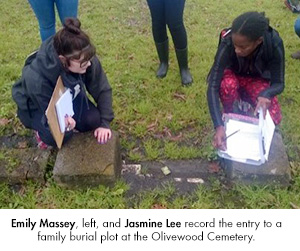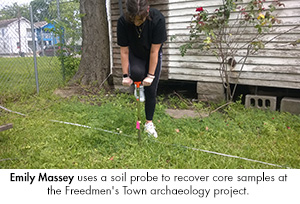 Thanks to contributions of Lone Star College-CyFair’s Anthropology Professor Dr. David Bruner and the research and work of his students, the United Nations Educational, Scientific and Cultural Organization (UNESCO) recently approved a "Site of Memory associated with the Slave Route" designation for six African-American historic cultural sites.
Thanks to contributions of Lone Star College-CyFair’s Anthropology Professor Dr. David Bruner and the research and work of his students, the United Nations Educational, Scientific and Cultural Organization (UNESCO) recently approved a "Site of Memory associated with the Slave Route" designation for six African-American historic cultural sites.
UNESCO’s slave route designation says that each cultural heritage site is a pivotal part of the African Diaspara that resulted from the transatlantic slave trade when Africans were brought to the U.S., sold as slaves and built churches, cemeteries and made their lives in these neighborhoods, said Dr. Bruner.
The Houston area sites include: Emancipation Park, Olivewood Cemetery, the African-American Library at the Gregory School, Antioch Church, and the Barbers Shop Property and Reverend Ned Pullum Property in Freedmen's Town.
“These sites are only the first 6 of the 70 African-American historic cultural sites we are striving to ultimately nominate for the UNESCO World Heritage Site listing,” said Dr. Bruner.
While this is a community success story, it is also a student success story for LSC-CyFair students, who not only receive course credit through LSC, but have provided substantive work throughout the UNESCO nomination process.
Dr. Bruner’s students have been recording grave markers, using UAVs or drones and ground penetrating radar to find unmarked graves and buried archaeological features, processing and organizing finds and digitizing a 120-year-old burial ledger associated with the Olivewood Cemetery.
 “This hands-on history project has been a way of dynamically interacting with the subject matter and it’s very relevant because our students are helping preserve history and learning about history in the process,” said Dr. Bruner. “Students have become engaged and enthusiastic to the point where many in the field are no longer in my courses and are just volunteers because they want to be anthropologists.”
“This hands-on history project has been a way of dynamically interacting with the subject matter and it’s very relevant because our students are helping preserve history and learning about history in the process,” said Dr. Bruner. “Students have become engaged and enthusiastic to the point where many in the field are no longer in my courses and are just volunteers because they want to be anthropologists.”
In addition, six students were paid for processing artifacts and data in Freedman’s Town through a $5,000 Texas Historical Foundation grant generated through the Yates Museum for an external internship that ends this semester.
One of the interns, who will be transferring to the University of Houston to further study and find her specialization in archaeology, is Emily Massey. While enjoying the exploring and organizing artifacts found, she has come to realize the importance of preserving the space in which they are digging.
“Getting protection under UNESCO sends a really important message about understanding the African-American history in the United States is just as important as Anglo American,” said Massey. “To protect these sites, you’re acknowledging the hardships and the accomplishments the African-American community has made and part of that history is remembering the horrific past, but understanding it’s the people’s ingenuity, their strength their community that got them through the awful times.”
Jasmine Lee, another intern who will also be going to the University of Houston, said they were learning techniques – digging in dirt, testing found items, cataloging and building a story from the fragments left behind – that are intrinsic to the discipline of anthropology. She was fascinated seeing how people went from enslavement and negotiated freedom to building a community.
“When we were in Freedmen’s Town and Olivewood Cemetery, we got to interact with descendants and hear oral histories not found in books,” Lee said. “There is a deep complicated rich history right in our backyard. And so much of it informs who are today. UNESCO makes that history important and brings to the forefront that it’s part of our global history.”
All are welcome to help celebrate the UNESCO designations May 21 at 9 a.m. at Olivewood Cemetery, noon at the Rutherford B. H. Yates Museum and 6 p.m. at Emancipation Park. For details on these celebrations or information on LSC-CyFair’s anthropology department, email David.E.Bruner@LoneStar.edu.
